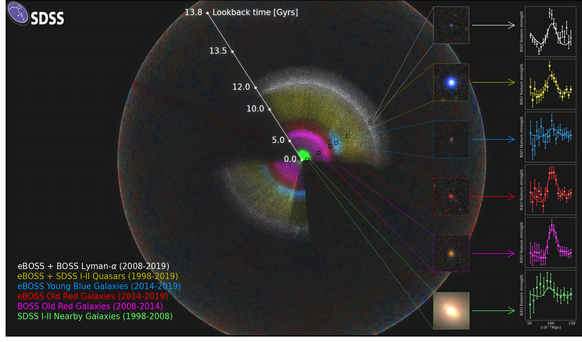NAOC Scientists Make Further Step Towards Understanding Dark Energy
The extended Baryon Oscillation Spectroscopic Survey (eBOSS) collaboration has released its latest scientific results. These results include two studies on dark energy led by Prof. ZHAO Gongbo and Prof. WANG Yuting, respectively, from National Astronomical Observatories of Chinese Academy of Sciences(NAOC).
The study led by Prof. Zhao was recently published in Monthly Notices of the Royal Astronomical Society.
Based on eBOSS observations, Prof. ZHAO's team measured the history of cosmic expansion and structure growth in a huge volume of the past universe, corresponding to a distance range between 0.7 and 1.8 billion light years away from us. This volume had never been probed before.
This study took advantage of a method called "multi-tracer analysis," which mitigated the observational systematics proposed and implemented by Prof. ZHAO and Prof. WANG.
"This work detected the existence of dark energy at a significance of 11 sigma, which is the strongest evidence ever on dark energy from galaxy surveys," said Prof. ZHAO. "The eBOSS observations are consistent with the dynamical dark energy probed by our team using the BOSS survey four years ago."
One of the biggest challenges of the cosmological implications of galaxy surveys is data analysis, especially developing new methods to improve statistical accuracy and mitigate systematics. eBOSS, as the first galaxy survey that observes multiple types of galaxies in a vast cosmic volume, makes it possible to use multi-tracer analysis.
"Cross-correlating multiple types of galaxies is an efficient way to reduce statistical uncertainties, with observational systematics mitigated at the same time, which is key to obtaining robust cosmological results," said Prof. WANG.
Dark energy dominates the current universe, so it is vitally important to reveal its nature. The eBOSS collaboration, which consists of over 30 top research institutes on astronomy around the world including NAOC, was formed to tackle the problem of dark energy. Operating since 2014, eBOSS has taken over 1 million spectra in the redshift range of 0.6.
Although eBOSS has completed its mission, it is a starting point for the next chapter. The experience with eBOSS is valuable for cosmology involving larger galaxy surveys, including the Chinese Space Station Telescope (CSST), Dark Energy Spectroscopic Instrument (DESI) and Prime Focus Spectrograph (PFS).
This work is supported by the Natural Science Foundation of China, Ministry of Science and Technology of China, and Chinese Academy of Sciences.
The study led by Prof. WANG Yuting was also published in Monthly Notices of the Royal Astronomical Society.

Exploration of the Universe by the SDSS mission during the past two decades (1998-2019) (Image by eBOSS collaboration)
Media contact: Prof. XU Ang, annxu@nao.cas.cn